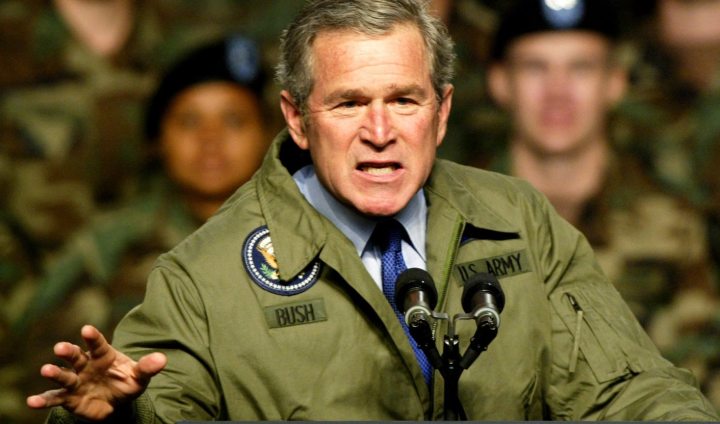World
Iraq War: Ten years, ten questions

A decade after Operation ‘Shock and Awe’, Iraq has been the captive of unspeakable violence. But what is at all about? KHADIJA PATEL asks 10 of the most pressing questions about the enduring legacy of the war in Iraq.
1. Was Saddam Hussein a cohort of Al-Qaeda?
Er, no.
The U.S. military’s first and only study looking into ties between Saddam Hussein’s Iraq and Al- Qaeda showed no connection between the two. The report released by the Joint Forces Command five years ago said it found no “smoking gun” after reviewing about 600,000 Iraqi documents captured in the invasion and looking at interviews of key Iraqi leaders held by the United States.
The Pentagon’s report also contradicts then-Secretary of Defence Donald Rumsfeld, who said in September 2002 that the CIA had “bulletproof” evidence demonstrating “that there are, in fact, Al-Qaeda in Iraq.” So too, former Secretary of State Colin Powell told the United Nations general assembly that the US was quite sure Saddam was in some way connected to Al-Qaeda.
Although other groups, like the September 11 commission, have concluded that there was no link between Hussein and Al-Qaeda, the Pentagon was able to analyse much more information and their findings were conclusive. The alleged links between Saddam Hussein and Al-Qaeda have been completely disproved by Americans themselves.
2. So where does Iraq currently figure in the global nexus of the war on terror?
This weekend, reports emerged that “the Islamic State of Iraq, an Al Qaeda-linked militant group”, had claimed responsibility for an attack on the Iraqi Justice Ministry. Meanwhile, another two car bombs had been detonated in the southern city of Basra. Almost daily, such news rings out from Iraq.
The Global Terrorism Index, a report released late last year by the Sydney-based Institute for Economics and Peace, revealed that more than a third of all victims of terror attacks between 2002 and 2011 were Iraqis and the biggest global rise in terrorism occurred between 2005 and 2007, which the authors attribute primarily to events in Iraq.
Apart from Al-Qaeda affiliates, other disgruntled factions of Iraqi society are also using violence in an attempt to expand their political influence. Analysts believe terrorism is simply feeding on Iraq’s violent past and the legacy of Saddam Hussein’s 30-year rule.
They say that while investigations have flouted Saddam Hussein’s links to Al-Qaeda, research has revealed that Hussein supported a number of terrorists and terrorist activities inside and outside Iraq. Whatever the origin of the reign of terror, it is a daily reality for Iraqis.
3. What about the sectarian divide between Sunnis and Shias?
The US occupation of Iraq did not cause sectarian divides but it did expose them. Writing in the Washington Post, Jocelyne Cesari says Saddam’s regime opened a Pandora’s box of sectarian divides, since religious and ethnic diversity was negated at the very foundation of modern Iraq. According to her, “democracy could be nothing else than sectarian by allowing groups previously persecuted to express themselves and compete for power.”
Other analysts believe that the narrative of Shia versus Sunni is flawed. Writing in The Guardian, Hayder al-Khoei points out that “both groups are being targeted by jihadists”. He adds:
“No one can claim that sectarianism in Iraq does not exist, but a closer look at the intra-sectarian conflict, sometimes just as bloody, can help paint a more nuanced picture.
“It was the intra-sectarian war between former Sunni insurgents and foreign Sunni jihadists, as well as the surge of US troops in 2007, that helped Iraq achieve relative stability. At the same time, the Shia-dominated Iraqi army battled it out with Shia militias in Basra.
“Today, unfortunately, the discourse has reverted to a black and white narrative that is misleading. The not so subtle intra-sectarian differences as well as intra-party politics are being missed.”
4. So, where were the weapons of mass destruction?
No such weapons have ever been found.
A special BBC Panorama programme aired on Monday night revealed how British and American intelligence agents were told through secret channels by Saddam Hussein’s foreign minister and his head of intelligence that Iraq had no active weapons of mass destruction. That information, however, was not passed to subsequent inquiries.
Tony Blair told parliament before the war that intelligence showed Iraq’s nuclear, chemical, and biological weapons programme was “active”, “growing” and “up and running”.
So too, then-Secretary of State Colin Powell, holding up a small vial of something meant to look sinister, addressed the UN Security Council said Iraq was armed and ready. While President George W. Bush’s National Security Adviser Condoleezza Rice acknowledged “some uncertainty” in Iraq’s ability to obtain a nuclear weapon, she warned, “We don’t want the smoking gun to be a mushroom cloud.” Others in the Bush administration were however more confident. Former CIA Director George Tenet told Bush there was a “slam dunk case” regarding such weapons programs in Iraq.
So what went wrong?
A report by the National Security Archive at George Washington University last year studied documents acquired from the CIA through a formal “Mandatory Declassification Review” request and found that the CIA itself “blames ‘analyst liabilities,’ such as neglecting to examine Iraq’s deceptive behaviour ‘through an Iraqi prism,’ for the failure to correctly assess the country’s virtually non-existent WMD capabilities.”
In other words, the rush to justify war in Iraq forced the CIA to make assumptions that were actually false. But not everyone believes the CIA simply bungled its intelligence.
Writing in Foreign Policy, Jeremy Hammond says, “The narrative of ‘intelligence failure’ attempts to obfuscate the truth of the matter, which is that senior government officials repeatedly lied and wilfully deceived the public by making claims unsupported by evidence and by deliberately withholding any information that contradicted their allegations.”
5. How much did the shock and awe cost?
Nobel prize winning economist Joseph Stiglitz estimated in 2008 that the Iraq war could cost America up to $5 trillion dollars. But a new study by Brown University’s Watson Institute for International Studies says the Iraq war costs could exceed $6 trillion, when interest payments are taken into account. That, and 4,486 soldiers’ lives.
6. What about the human cost?
According to Iraq Body Count – a project founded in January 2003 by volunteers from the UK and USA “who felt a responsibility to ensure that the human consequences of military intervention in Iraq were not neglected” – between 112,017 and 122,438 civilian deaths from violence have been documented between 20 March 2003 and 14 March 2013.
In addition some 39,900 combatants (of all nationalities) have been killed in Iraq in the last ten years, so the total number of people documented to have been killed is 174,000. (Interestingly, Iraq War claimed 288 journalists and media workers’ lives.)
In May 2012 the Iraqi Human Rights Ministry reported that there had been 250,000 injured since 2003.
7. So the war goes on even though US troops are gone?
In its annual report last year, Iraq Body Count warned that “the country remains in a state of low-level war… with a ‘background’ level of everyday armed violence punctuated by occasional larger-scale attacks designed to kill many people at once.”
US troops withdrew in December 2011, but a small contingent of around 150 soldiers remains as part of a bilateral agreement to help train and supply Iraq’s security forces, as well as thousands of private ‘security contractors’.
Baghdad’s police and military are widely agreed to be largely able to maintain internal security, but are not expected to be fully capable of defending Iraq’s borders, airspace and waters until 2020. But according to a survey released by Gallup Tuesday, more Iraqis report that security in the country has gotten better (42%) than worse (19%) now that U.S. troops are gone.
8. Life’s better for Iraqis now, right?
Iraq passed a critical milestone in 2012 by producing three million barrels a day of crude oil for the first time since 1990, reaching 3.4 million barrels a day by December last year. It was welcome news for a country as ravaged by war as Iraq, but there is little for Iraqis themselves to celebrate. Though the oil industry accounts for over 90% of Iraq’s income, it provides few opportunities for Iraqis themselves, since it employs barely one percent of the country’s workforce.
Agriculture supplies a fifth of all Iraqis with a living, but only four percent of the gross domestic product, leaving those who depend on it in relative poverty.
Meanwhile, the Iraqi private sector has developed much less than had been hoped. So too, state institutions are still rudimentary facilities. The country is struggling with widespread poverty, an employment rate of 18%, rising illiteracy and corruption – Iraq ranks 169th out of 174 countries on the corruption index. Writing in The Sun this week, Tony Blair quotes a poll that claims 90% of Iraqis in the north of the country believe security and life have improved.
Forgive our skepticism, Tony.
There’s the issue of a sharp rise in congenital birth defects, cancer cases, and other illnesses throughout much of Iraq since the US invasion.
Health workers believe the depleted uranium used by allied forces during the invasion is connected to the recent emergence of diseases that were not previously seen in Iraq, such as new illnesses in the kidney, lungs, and liver, as well as total immune system collapse. There has also been a dramatic jump in miscarriages and premature births among Iraqi women, particularly in areas where heavy US military operations occurred, such as Fallujah.
9. So it was all about the oil?
Well, yes. And US officials have themselves conceded this point.
There was the fact that the only building American troops protected during the post-invasion rioting was the Oil Ministry. Priceless historical artefacts were lost when the Baghdad’s National museum was looted, but the oil fields were secured and in no time, production was resumed.
As Mother Jones points out, no less than Alan Greenspan conceded after the fact that the war was “largely about oil.”
10.Would the US and its allies do it again?
While we remember the 10th anniversary of the start of the war in Iraq, we ought also to remember the 2nd anniversary of the start of NATO’s “no fly zone” in Libya. Iraq left the US with burned fingers and in Libya, Mali and Syria there was the reluctance of the US to take the lead in similar operations since Iraq.
So would they do it again?
Some would argue that they already have.
To quote Tony Blair again, “I understand why, after long, hard and often brutal campaigns in Iraq and Afghanistan, people say: It’s a mistake – we should never have been there.
“They look at the carnage in Syria and say: Nothing to do with us.
“They see what is happening in Mali and across North Africa and say: Let someone else sort it out.
“But I do not believe we can or should stand aside from the global struggle against this extremism and, although we pay a heavy price for intervention, we should not think staying out is cost-free.” DM
Read more:
- Crusade versus Jihad: The mistaken narratives of a misbegotten war in Daily Maverick
Photo: U.S. President George W. Bush addresses U.S. Army soldiers and their families at Fort Hood, Texas, January 3, 2003. Bush addressed the rising tensions with North Korea and the possiblity of military action against Iraq. REUTERS/Jeff Mitchell


















 Become an Insider
Become an Insider